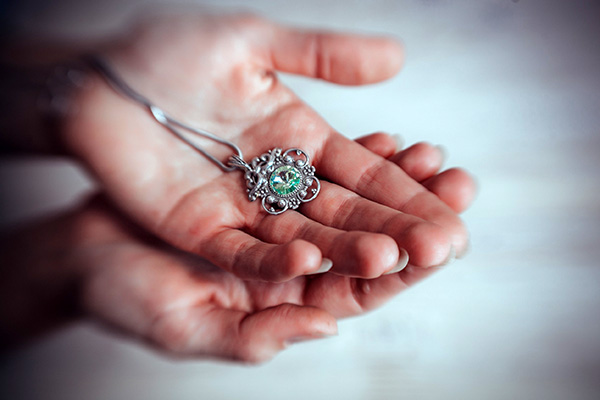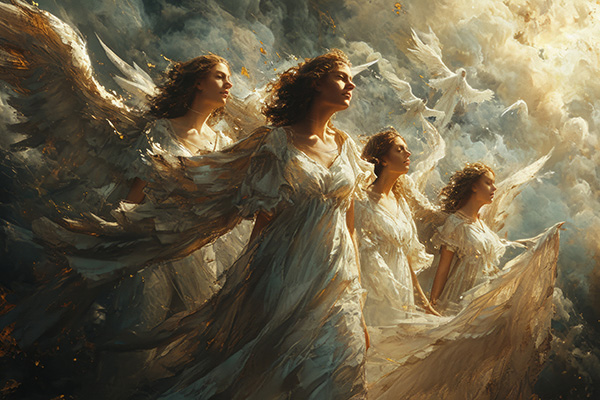psychic experiences
Psychic Tools And A Book Of Raffle Tickets
 Psychics and mediums are always learning. Often, our clients become some of our greatest teachers, reflecting spiritual truths and new insights back to us in unexpected ways.
Psychics and mediums are always learning. Often, our clients become some of our greatest teachers, reflecting spiritual truths and new insights back to us in unexpected ways.
One of the most enriching aspects of my spiritual journey has been participating in a small mediumship development group. We regularly meet to hone our mediumistic skills under the guidance of our wonderful mentor, who brings a touch of playfulness to our sessions.
At our most recent meeting, she introduced a fascinating psychic exercise using a book of raffle tickets. Each of us were asked to tear out a ticket identical in color to preserve anonymity and place it in a container.
Then we each drew a ticket at random to be paired with someone. The idea was to tune into the energy of the person whose ticket we had drawn and offer a psychic reading based solely on that energetic connection. Though similar to psychometry, the process felt slightly different and refreshingly new.
The reading I received from the person who picked my ticket turned out to be quite accurate. They picked up on discomfort in my foot, which made me laugh because I had been dealing with an ingrown toenail that morning. It was a small detail, but striking in its specificity.
When it was my turn to give a reading, I felt guided to look at the numbers on the ticket I had drawn. I added the four digits together to calculate the seeker’s Life Path number. I was surprised by how much insight flowed through from there. It seemed to resonate deeply with the person I was reading for.
The Time I Visited All My Pets In The Afterlife
 Life has become much clearer to me over the years. But not in the usual way you might expect.
Life has become much clearer to me over the years. But not in the usual way you might expect.
Having a Near Death Experience (NDE) during surgery at the age of 34, plus practicing as a professional psychic reader fo over 46 years, changes your outlook on life and death in many ways.
One of the questions my clients sometimes ask is, “Do pets go to Heaven?” From my lived experience, the answer is a resounding, yes!
During my NDE, I remember quickly rising up through a tunnel toward a light so bright I had to squint my eyes. I then arrived in a space that felt like the outside of an elevator. It was some kind of ‘in-between area.’
As I stepped inside, every pet I had ever loved in my life up to that moment was gathered around my feet, tails wagging, overjoyed to see me. Dogs and cats…they were all there!
So yes, in my experience, your pets will be there to greet you, just as mine were. On the other side, there are animals of all kinds, peacefully coexisting and filled with joy. I have no doubt our pets in Heaven know when we are coming home to join them. They wait for us with open hearts.
In Heaven, if you wish to have a home, you will. What you think becomes your reality there. So, of course, your beloved pets will once again live with you. They are already running, playing, and waiting for you and you will recognize each one of them.
Guiding A Friend To Embrace Her Psychic Path
 Awakening as a psychic medium is not something most people decide to do on a whim. Sometimes, the calling arrives unexpectedly, through guidance that cannot be ignored.
Awakening as a psychic medium is not something most people decide to do on a whim. Sometimes, the calling arrives unexpectedly, through guidance that cannot be ignored.
This story is about one of those moments. It is the journey of helping a close friend embrace her psychic and mediumship abilities after receiving clear messages from both our guides that this path was necessary.
What followed was not only her awakening, but a powerful shared experience of trust, fear, growth, and spiritual confirmation.
I have known her for over forty years. We met during a time in our lives when we were open to new experiences and spiritual exploration. We always believed in the psychic realms without fear or negativity. I knew I had abilities back then, and so did she, even if she was not aware of them yet. Everyone awakens in their own time.
We were more than friends. We were spiritual partners. That bond deepened over the years. When my journey fully began, she was fascinated and full of questions.
One day, I had to say to her, “I’ve been told you are also a psychic medium.” That is not something you casually say to someone. I know this path well myself, but even so, hearing it can be life-changing. Becoming a psychic is a huge commitment, and it is not always easy to accept. Many people struggle with it at first.
The Blessing Of Mediumship
 As a medium, there is nothing more rewarding than bringing through a loved one who has passed on to Spirit. It is tremendously fulfilling to be able to deliver messages from another plane and to put someone’s mind at ease here on Earth.
As a medium, there is nothing more rewarding than bringing through a loved one who has passed on to Spirit. It is tremendously fulfilling to be able to deliver messages from another plane and to put someone’s mind at ease here on Earth.
Often, departed loved ones will come through to give a progress report of sorts, so that family or friends will know that they are happy, pain-free and adjusting beautifully to their new surroundings.
In addition, they might weigh in on a family dilemma, reassure a friend that the right decision was made or confirm that everything is currently on track for success.
Readings of this nature are a win-win-win for everyone: for the person who has passed on to Spirit, for the person requesting the reading, and also for me.
Over the years, I have received countless confirmations from readings given privately and in the various spiritualist churches. Although I would never take Spirit’s work for granted, because all messages are important for different reasons, there are many that stand out because of the wonderful reactions they caused.
Once, I was attending a potluck supper at one of the churches and, as I was standing in line for the buffet, I felt a tap on my shoulder. As I turned around to see who was there, an older woman said, “Well, here he is!” She pointed to a man standing beside her.
A few years before, Spirit had advised that she would be getting remarried and, at her age, she didn’t believe it for a minute. Fast forward a few years and she brought him to the church supper in the hope that I would be there to meet him in person. She was thrilled beyond belief and beamed with pride as she told me the story of where they had met and how their relationship had progressed so beautifully. Continue reading →
Echoes Of Love In Every Clasp And Chain
 The jewelry we inherit is more valuable than it seems. A gold ring passed down from a grandmother, a locket that once rested against a mother’s pulse, or a watch that marked the minutes of a father’s days. Even after they’re gone, these objects keep on humming, full of loving memories.
The jewelry we inherit is more valuable than it seems. A gold ring passed down from a grandmother, a locket that once rested against a mother’s pulse, or a watch that marked the minutes of a father’s days. Even after they’re gone, these objects keep on humming, full of loving memories.
It’s hard to explain to someone who hasn’t experienced loss, but wearing that old ring or putting on that familiar chain feels like stepping into another time and place. And for a second, you see them.
Maybe the piece fits your ring finger or wrist a bit differently than it did theirs, but it still connects the past with the present. Their jewelry isn’t just a piece of metal or stone; it’s a fingerprint, a story, a fragment of a laugh, a favorite saying captured in something lasting you can hold.
Some days, their jewelry and other personal belongings are a source of comfort. Other days, it serves as a stark reminder of heartache and loss. Either way, it shows that love isn’t just some fleeting thing.
Love lasts in the smallest details: the things that touched their skin and caught their scent. The soft click of a clasp. The nice weight of it against your collarbone.
They say you can’t take anything with you, but maybe that’s not the point. Maybe the real magic is in what’s left behind: a ring, a pendant, or a string of pearls. Little things that are full of love keep us connected to the people who matter most, even when they’re now on the other side.
When I was a little girl, my grandma used to let me wear her fake diamond earrings. They were the only piece of her jewelry she ever let me touch. I always had to give them back when playtime was over. It felt special, like she was letting me borrow a little piece of her magic. After she passed away, my mom gave me Grandma’s earrings.
Voice Messages From The Spirit Realm
 Many years ago, during one of the psychic circle gatherings that I used to host, a loud male voice suddenly echoed from just outside the room. Everyone immediately assumed it was my husband, but he was the only one who wasn’t home at the time. We hadn’t heard the electric gate open or his truck approach.
Many years ago, during one of the psychic circle gatherings that I used to host, a loud male voice suddenly echoed from just outside the room. Everyone immediately assumed it was my husband, but he was the only one who wasn’t home at the time. We hadn’t heard the electric gate open or his truck approach.
The voice clearly said, “Hello, girls.” My immediate thought was of my father, who had frequently attended our monthly circles since his passing years earlier.
I have deep respect for experiences like this. It takes considerable energy for spirits to connect with us in such a tangible way through sound. Sound is a dense, physical vibration, one of the lowest frequencies for a spirit to manipulate. Unlike the speed and subtlety of mental, emotional, or psychic communication, external sound requires far more deliberate shaping of energy.
In order to be heard audibly, spirits must bridge a vast vibrational gap by lowering their frequency to become perceptible to our physical senses. This is why such phenomena are rare and profound, requiring effort from the spirit and heightened sensitivity, openness, and reverence from us as receivers.
After inventing the telephone, Alexander Graham Bell reportedly dedicated himself to developing a device that could capture spirits’ voices. Unfortunately, he passed away before realizing that goal. I believe he would be intrigued by the sophisticated digital instruments we now use to detect paranormal activity.
Asking The Angels For Everyday Guidance
 Since a very profound experience of angelic visitation at the age of nine, I have regularly called upon the angels for guidance and protection in my daily life.
Since a very profound experience of angelic visitation at the age of nine, I have regularly called upon the angels for guidance and protection in my daily life.
I do this for a reason. I have learned over the years that it is necessary to take the initiative to ask for and invoke their help, because they will never interfere with our free will in how we choose to steer our personal path in life, unless they have to intercede in life-threatening situations.
Angels respect our autonomy and only intervene in our daily lives when called upon or in times of great need, when their intervention is in alignment with our soul’s higher purpose.
Angels most often come to us in our dream state, but sometimes also in visions and apparitions, to offer support, protection, and guidance. In recent months, however, I have found myself practicing an additional means of interacting with the angels.
As a young girl, I did not tell anyone about my angel experience for several years. The first time I mentioned my angel vision was on a walk with my father when I was a teenager. I felt more comfortable sharing my experience with him after he told me about an event that had changed him in an instant from a skeptical atheist to a spiritual believer (read more in a previous blog)
My father’s response was simply, “Why didn’t you talk about this before?”
He was very receptive when I opened up about what had happened that night when the ceiling in my bedroom seemed to dissolve… and there they were, a group of beautiful angels telepathically telling me, “We will always be with you.”
- Mafredo on Psychic Forecasting Of The Financial Markets
- Joan on Reflections On Time…And The Timeless
- Ma8 on Reflections On Time…And The Timeless
- Flowers name in Hindi on The Mystical Secrets Of Flowers
- Pam on How To Connect With Your Guardian Angel
- astrosaiganesh on How To Navigate The Sun’s Debilitation In Libra
- mahendar on What Happens To Our Pets When They Cross Over
- Megan Gutleben on How To Maintain A High Vibe Every Day
- spiritual healing on The True Role Of The Spiritual Healer
- Mballe on Why Some Souls Depart This Life Early
- Elizabeth Ocskay on The Mystery Of Soul Groups And Soul Contracts
- Christopher Guleff on The Mystical Purpose Of Daydreaming
- devanand astrologer on Psychic Messages In Mediumship Readings
- Linda Deir on Our Pets Speak To Us In This Life And Beyond
- Veronica on Why Some Souls Depart This Life Early
- astrologer devanand on Chakra Balancing Is An Essential Self-Care Practice
- Kirti on How To Deal With Negativity And Toxic Drama
- psychicramdev on How To Navigate The Sun’s Debilitation In Libra
- Grace on The Psychic Technique Of Remote Viewing
- Pam on Energy Protection 101